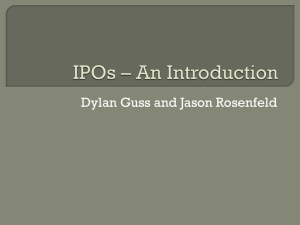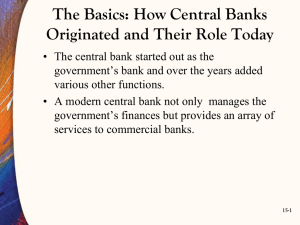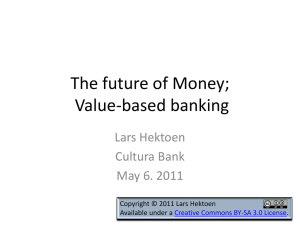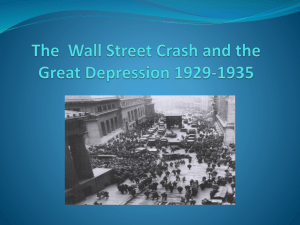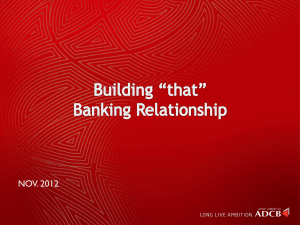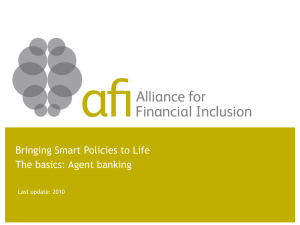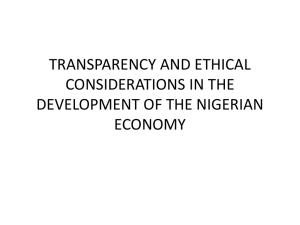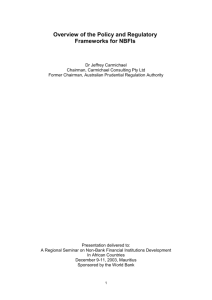Speech by Merel van Vroonhoven of the Netherlands
advertisement
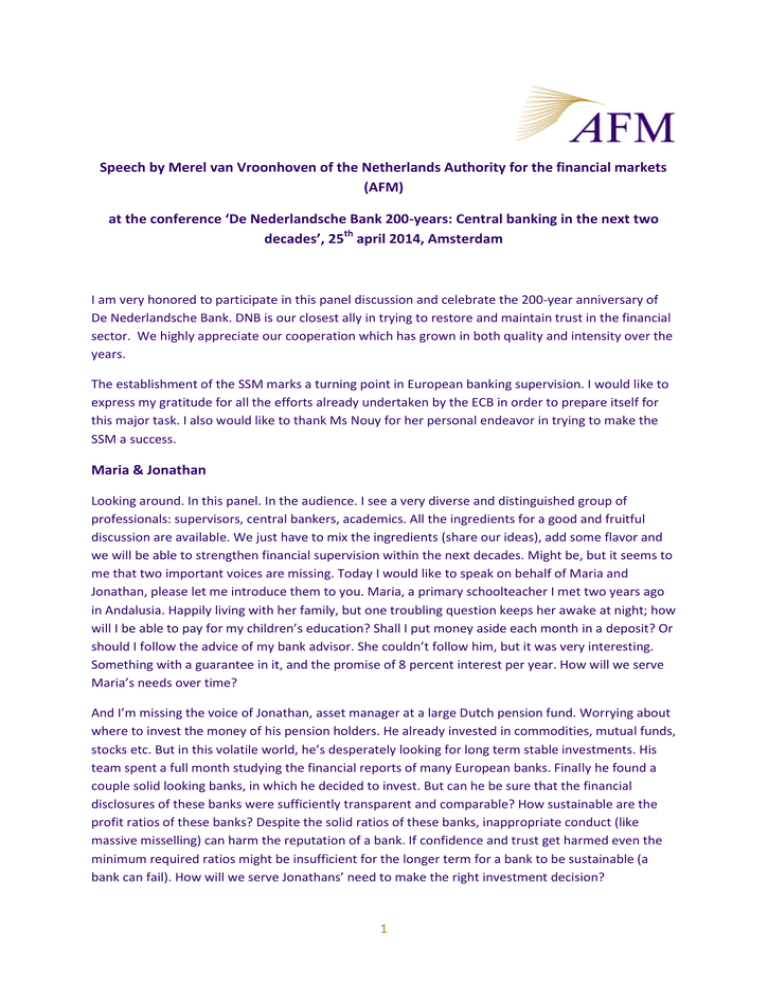
Speech by Merel van Vroonhoven of the Netherlands Authority for the financial markets (AFM) at the conference ‘De Nederlandsche Bank 200-years: Central banking in the next two decades’, 25th april 2014, Amsterdam I am very honored to participate in this panel discussion and celebrate the 200-year anniversary of De Nederlandsche Bank. DNB is our closest ally in trying to restore and maintain trust in the financial sector. We highly appreciate our cooperation which has grown in both quality and intensity over the years. The establishment of the SSM marks a turning point in European banking supervision. I would like to express my gratitude for all the efforts already undertaken by the ECB in order to prepare itself for this major task. I also would like to thank Ms Nouy for her personal endeavor in trying to make the SSM a success. Maria & Jonathan Looking around. In this panel. In the audience. I see a very diverse and distinguished group of professionals: supervisors, central bankers, academics. All the ingredients for a good and fruitful discussion are available. We just have to mix the ingredients (share our ideas), add some flavor and we will be able to strengthen financial supervision within the next decades. Might be, but it seems to me that two important voices are missing. Today I would like to speak on behalf of Maria and Jonathan, please let me introduce them to you. Maria, a primary schoolteacher I met two years ago in Andalusia. Happily living with her family, but one troubling question keeps her awake at night; how will I be able to pay for my children’s education? Shall I put money aside each month in a deposit? Or should I follow the advice of my bank advisor. She couldn’t follow him, but it was very interesting. Something with a guarantee in it, and the promise of 8 percent interest per year. How will we serve Maria’s needs over time? And I’m missing the voice of Jonathan, asset manager at a large Dutch pension fund. Worrying about where to invest the money of his pension holders. He already invested in commodities, mutual funds, stocks etc. But in this volatile world, he’s desperately looking for long term stable investments. His team spent a full month studying the financial reports of many European banks. Finally he found a couple solid looking banks, in which he decided to invest. But can he be sure that the financial disclosures of these banks were sufficiently transparent and comparable? How sustainable are the profit ratios of these banks? Despite the solid ratios of these banks, inappropriate conduct (like massive misselling) can harm the reputation of a bank. If confidence and trust get harmed even the minimum required ratios might be insufficient for the longer term for a bank to be sustainable (a bank can fail). How will we serve Jonathans’ need to make the right investment decision? 1 Key message: Conduct-of-business supervision I believe that with the banking union, we are making giant steps in safeguarding the interests of both Maria and Jonathan. But I also feel we need to make an extra step. To reestablish and sustain trust in the financial sector as a whole for the coming decades, I believe there is a strong case to not only intensify prudential supervision but to also foster conduct-of-business supervision. Both on a national and a European level. I strongly believe that the relevance of conduct-of-business supervision should not be underestimated within the context of the banking union. Let me briefly explain how I come to this believe (conviction). Of course it is very important that we thoroughly assess banks’ buffers, balance sheet ratios and other quantitative criteria. But we should all be aware that a healthy bank is first and foremost a bank that has a sustainable business model that treats both customers and investors fairly. I think there is a need to focus on fair and equitable behavior between market participants and towards customers and investors. Recent crises have shown us that both customers and investors did not understand what they were buying. And worse in many cases products and services didn’t fit the customers’ and investors’ needs. In my vision customers and investors should no longer be exposed to banking activities which are not in their interest. Also investors must be able to be able to assess the risks of their investment. The question I’ve been asking myself is: how can we make sure that banks throughout the Eurozone and the European Union put their clients’ interests first? What are we entitled to expect from banks? As a conduct supervisor I would say three things: 1. The focus of banks should be on the design of products that ultimately corresponds with their customers’ needs. 2. Additionally, information on financial products and services to customers and investors has to be functional and accurate. 3. Banks should enhance their disclosure of valuation and risk. This is of utmost importance to restore investors’ confidence and stabilize a banks’ ability to get access to whole sale funding. The comprehensive assessment is of course a major step in this regard. And although it is generally acknowledged that quality of financial statements has improved, users of these statements are still facing challenges in forming a clear and comprehensive understanding of the individual risks faced by banks. In order for the banking union to be effective, it is key that these elements of conduct supervision are taken into account in the banking union. Prudential and conduct-of-business supervision are complementary to one another. Therefore, on the short-term I would like to suggest that the ECB and national conduct supervisors engage in a dialogue. I would like to give an example on how the DNB and AFM currently cooperate on culture and ethics. In the Netherlands we arrived at the conclusion that more detailed rules do not necessarily lead to the needed incentives for the right cultural and ethical direction of our banks. We strongly believe that the culture and ethical standards are an indispensable component for a bank to manage its exposure to excessive risk taking as well as to liability due to misconduct. 2 Culture and ethics are, however, difficult to regulate and enforce. As a result, we needed to jointly develop a sophisticated and nuanced approach to culture. We decided to jointly investigate boardroom dynamics, through fit and proper tests. We also assess the capability of banks to change. By this close combination of risk and conduct supervision we are able to influence the attitudes, culture and ethical stance of banks. In our view, this can help to mitigate the behavioral risks inherent to the banking business. I would like to quote the famous writer named C.S. Lewis “Integrity is doing the right thing, even when no one is watching”. Isn’t that what we expect from banks. To wrap things up: I believe the establishment of the SSM is a very important institutional next step in a series of European policy responses to the credit crisis. It started with the establishment of the ESFS, which gave birth to EBA, ESMA, EIOPA and the ESRB. The creation of a solid prudential supervisory mechanism for the banking industry will definitely add to the robustness of the financial system. But the question I would like to pose to you is this one: will it be enough? Although we noticed positive changes in regard to saver and fair financial products and services offered by banks, research still shows a decline of trust in the financial sector. Therefore, my answer would be: no (the current changes are not enough). We need to further develop, step by step, conduct-of-business regulation and supervision at a European level, and across sectors. The challenge will be to do this across sectors instead of sector by sector, starting with sharing perspectives and experiences and ultimately building effective European conduct of business regulation. On top of that an intrinsic change of culture within banks is of paramount importance to assure that ‘treating clients fairly’ is on top of mind of all banks and information is disclosed sufficiently. 3
